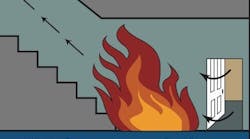Known as the "Firefighter Investment and Response Enhancement Act" (FIRE Act), H.R. 1168 was introduced by Rep. William Pascrell (D-New Jersey) and calls for the federal government to provide $1 billion a year, for five years, in grants to local fire departments. The funds could be used for many purposes to provide financial relief to fire departments that desperately need help after years of budget cutting by local jurisdictions. It also was intended to give the fire-rescue service the same kind of support that the federal government routinely gives to other branches of local government, such as education and law enforcement.
All of the major fire organizations went to work on Capitol Hill lobbying for the bill's passage, but as it turns out they never had a chance. From the start, the FIRE Act carried the burden of being a big-spending bill, introduced by a Democrat, in a Congress controlled by Republicans, who are committed to reducing spending and maintaining a balanced budget. That hurdle was simply too much to overcome. Of the bill's 198 co-sponsors, only 49 were Republicans; the rest of the GOP majority and its leadership are either indifferent or opposed to Pascrell's bill.
The fire-rescue service attempted to organize a grass-roots campaign to influence Congress, but it had no impact. The argument that they hand out $7 billion every year for federal programs to aid local police departments fell on deaf ears. Worse yet, there was no show of public concern or support for the FIRE Act like there is for legislation that aids the schools and the police. Very few state and local elected officials did anything to help, even though their policies are responsible for the disaster that has crippled many fire departments. And, the Clinton White House gave no sign of any interest in the Pascrell bill, despite its being introduced by a Democrat and having considerable party support.
In short, the Republicans had nothing to fear and refused to allow the FIRE Act to even get a hearing in the House Science Committee. Last month, the GOP leadership let it be known that H.R. 1168 would remain buried there to die a slow death. Ironically, the word came as the FIRE Act was introduced in the Senate by Senators Mike DeWine (R-Ohio) and Christopher Dodd (D-Connecticut), but with the House refusing to move, that didn't mean much.
However, Rep. Curt Weldon (R-Pennsylvania) did get a pledge from GOP Majority Leader Richard Armey (R-Texas) that he was willing to see some kind of fire legislation passed, but not $1 billion worth. The exact amount is uncertain, but $100 million is the figure that was talked about in meetings between Weldon, Pascrell and Rep. Steny Hoyer (D-Maryland), a co-chair of the Congressional Fire Service Caucus. It amounts to a "mini-FIRE Act" and Rep. Nick Smith (R-Michigan), chairman of the Science Sub-committee on Basic Research, told Firehouse® that he would be willing to hold hearings on a new or revised bill.
It's also unclear as to what the money could be used for. Hoyer wants to see some of it earmarked for burn research. Weldon has suggested a program of low-interest loans to buy apparatus and equipment, and more funds to help smaller volunteer departments. As this is written, Pascrell has not backed away from his bill and is considering various options. His main concern is that there has to be a "significant" amount of money and an on-going commitment for several years, not just a one-year, one-shot deal.
The reaction among the fire organizations was one of anger and bitter frustration. Congress wouldn't dare to refuse to hold a hearing on legislation that was important to the police and many think the fire service should keep fighting, even though it's a lost cause.
"We want a hearing and an up-or-down vote on the Pascrell bill...and let those who defeat us get the blame," says one congressional lobbyist who has worked hard to gain support for the FIRE Act. He argues that $100 million is "crumbs" in comparison to the $1 billion in the FIRE Act and the $7 billion given to the police every year.
But another who has lobbied for the bill thinks the offer may be worth considering. He points out: "It's a lot more than we ever got in the past and it could be a start, a stepping stone to getting more in the future...and the Pascrell bill made it possible." He adds that it's not uncommon for major spending legislation to start out small and increase by increments over a period of years.
The debate is underway and, at this point, we don't know how it will end. But here's the dilemma facing the fire-rescue service: do you go down in flames with the original FIRE Act and get nothing, or do you take whatever you can get now and try for more in the future?
One thing does seem clear. Unfortunately, the so-called "sleeping giant" of fire service political power didn't make the slightest impression on the Republicans who killed the FIRE Act. They know the voters don't care about fire problems and it's unrealistic to think this can be used as an effective issue against them in the 2000 congressional elections. A few of them may be vulnerable, but if you really want to punish someone in the next election, go after those irresponsible, double-crossing local officials who ruthlessly slashed fire department budgets and created this mess in the first place.
The prime targets of the fire service's wrath should be mayors and county executives, city and county council members. They're the real villains in this sad story.
Hal Bruno, a Firehouse® contributing editor, is a retired political director for ABC News in Washington and served for 40 years as a volunteer firefighter.




